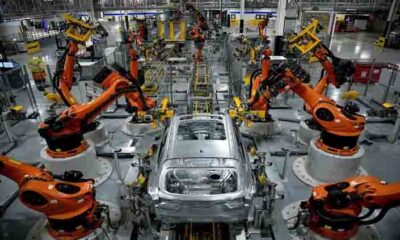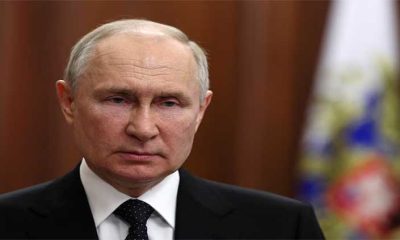Japan’s Nippon Steel clinched a deal on Monday to buy US Steel for $14.9 billion in cash – prevailing in an auction for the 122-year-old iconic steelmaker over rivals including Cleveland-Cliffs, ArcelorMittal and Nucor – to create one of the world’s biggest steel companies outside of China.
The deal price of $55 per share represents a whopping 142 per cent premium to Aug 11, the last trading day before Cleveland-Cliffs unveiled a $35-per-share, cash-and-stock bid for US Steel, which was once the largest company in the world. It is a bet that US Steel will benefit from the spending and tax incentives in President Joe Biden’s infrastructure bill.
Under terms of the deal, US Steel’s operations will retain its name and continue to have its headquarters in Pittsburgh.
Cleveland-Cliffs’ pursuit prompted US Steel to launch a sale process four months ago. In a meeting of its board of directors on Sunday, US Steel deemed Nippon’s offer superior to a sale to Cleveland-Cliffs, which had raised its bid in the high $40-per-share range, people familiar with the matter said.
Nucor, the largest US steelmaker, offered to acquire US Steel in partnership with another company, one of the sources said. The identity of that company could not be learned.
ArcelorMittal also pursued US Steel, Reuters has reported. Nippon and ArcelorMittal own a plant in Alabama that produces steel sheet products by processing semi-finished products, or slabs, procured from local and overseas suppliers. They are also investing about $1 billion in an electric arc furnace.
The acquisition of US Steel will help Nippon, the world’s fourth largest steelmaker, move toward 100 million metric tons of global crude steel capacity, while significantly expanding its production in the United States, where steel prices are expected to rise as automakers ramp up production following their recent deals with labor unions to end strikes.
Nippon did not give any projection on the value of the synergies that will arise from the deal, to justify the price it agreed to pay. It said the synergies will come from pooling advanced production technology and know-how in product development, operations, energy savings and recycling.
Nippon is paying the equivalent of 7.3 times US Steel’s 12-month earnings before interest, taxes, depreciation and amortization (EBITDA), LSEG data shows. The median in the steelmaking industry is seven times, and some analysts said
US Steel was worth less given that its $774 million takeover of the Big River steel mill in Arkansas in 2021 has yet to pay off in profitability.
“We feel Nippon is overpaying for those assets. This isn’t the technology space. This is still the cyclical steel industry,” said Gordon Johnson, analyst at GLJ Research.
US Steel shares ended trading up 26pc at $49.59 on Monday following the deal announcement. Nippon Steel shares were down 2.78pc by 0508 GMT on Tuesday.
Cliffs shares jumped 10pc to $20.50 in New York as shareholders cheered the company deciding against splashing out on US Steel. Cliffs said it would now press on with “aggressive share buybacks” under a program it had previously authorized.
ArcelorMittal shares also rose 5pc to 26.28 euros in Amsterdam on similar investor relief.
Losing the auction for US Steel will also likely result in Cliffs failing to renew a contract to provide slabs to ArcelorMittal and Nippon’s Alabama plant that expires in 2025, the sources said. This is because Nippon will now turn to US Steel as a supplier, the sources added. The value of the contact could not be learned.
UNION OPPOSES
All of US Steel’s commitments with its employees, including all collective bargaining agreements in place with its union, will be honoured, Nippon said.
Despite these assurances, the United Steelworkers union, which had endorsed heavily unionized Cliffs as the acquirer, said it is opposed to the sale to Nippon because it did not have faith in labor agreements being upheld.
“Our union intends to exercise the full measure of our agreements to ensure that whatever happens next with US Steel, we protect the good, family-sustaining jobs we bargained,” United Steelworkers said.
A spokesperson did not respond to a request for comment on further details on the union’s plans. In its pact with US Steel, United Steelworkers is not afforded the right to block the company’s sale if the acquirer commits to preserve existing labor agreements.
Nippon Executive Vice President Takahiro Mori told Reuters in an interview that the company had operated in the United States for 40 years and that it was confident the transaction would be completed.
“Standard Steel and Wheeling Nippon Steel that we own are unionized companies in the United States; we have a good history of working with unions. We see no regulatory or antitrust issues with the deal,” Mori said.
Nippon’s joint venture with Arcelor is not unionized.
The transaction with Nippon is expected to close in the second or third quarter of 2024, subject to regulatory approvals, US Steel said.
The Committee on Foreign Investment in the United States, a US panel that scrutinizes deals for potential national security risks, is expected to review the transaction, though most Japanese acquirers complete their deals with few issues.
Analysts also said the deal should attract little antitrust scrutiny given the limited overlap between Nippon and US Steel. The companies said that in the event that regulators shoot down the deal, Nippon will owe US Steel a $565 million break-up fee.
Some US lawmakers whose constituencies have major steelworker populations expressed hostility toward the deal. Republican Senator JD Vance of Ohio said he will scrutinize its implications for the “security, industry, and workers” of the United States. Democratic Senator John Fetterman of Pennsylvania went further, vowing to do anything in his power “to block this foreign sale”.
US Steel, founded in 1901 by some of the biggest US magnates, including Andrew Carnegie, JP Morgan and Charles Schwab, became intertwined with the United States’ industrial recovery following the Great Depression and World War Two.
But like the wider US steel industry, its dominance has eroded over decades in the face of cheaper foreign competition. Currently, it employs more than 22,000 people globally, including more than 14,000 in the US.
The Pittsburgh-based company’s shares had underperformed of late, following several quarters of falling revenue and profit, making it an attractive takeover target for rivals looking to add a maker of steel used by the automobile industry.
Beyond carmakers, US Steel supplies the renewable energy industry and stands to benefit from the Inflation Reduction Act (IRA), which provides tax credits and other incentives for such projects, something that attracted suitors.
Post Views: 81


 Fashion3 months ago
Fashion3 months ago
 Sports3 months ago
Sports3 months ago
 Sports3 months ago
Sports3 months ago
 Fashion2 months ago
Fashion2 months ago
 pakistan3 months ago
pakistan3 months ago
 World3 months ago
World3 months ago
 pakistan3 months ago
pakistan3 months ago
 Tech3 months ago
Tech3 months ago



















